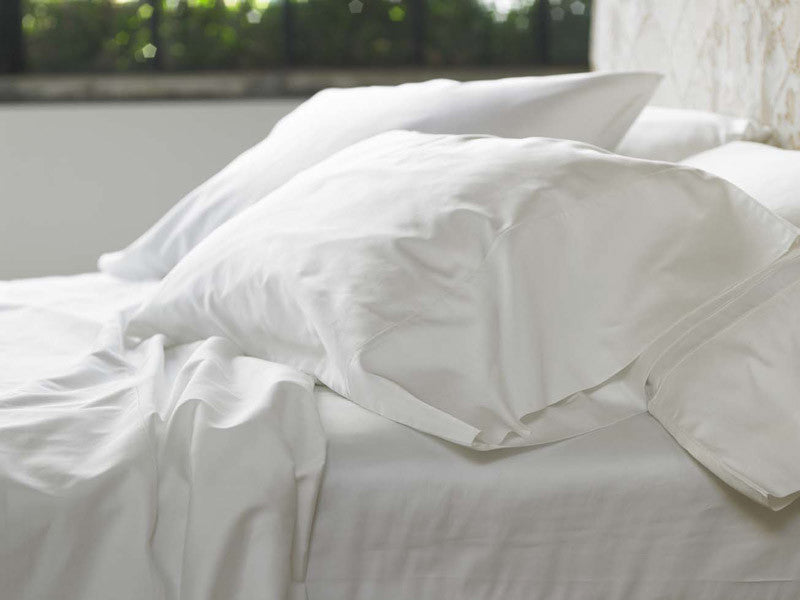
You might think thread count and hand-feel are the only things that matter when buying sheets. But when you’re creating a healthy, toxin-free bed it’s essential to know what sheets are made of and how they’re processed. Here are 4 things to consider when shopping for healthier alternatives to conventional sheets:
1. Chemical-Free
A label on new sheets tells us the fiber content, thread count and care instructions – that’s it. Unfortunately, the manufacturer is not required to list what chemicals they use to make the sheets. Why does it matter? Numerous chemicals are used to conventionally process the yarn and finish the fabric, many of which are raising serious concerns from scientists, doctors and the public about toxicity and the adverse effects on our health. For non-toxic bedding, make sure you know how your sheets are processed.
You can drastically minimize chemical exposure from sheets when you:
- Avoid cotton sheets labeled “Wrinkle-Free”, “Easy Care” and “Permanent Press”. These labels indicate the fabric has been treated with formaldehyde resin, one of the most toxic chemical fabric finishes and it’s designed NOT to wash out.
- Avoid synthetic fiber sheets such as polyester microfiber. Polyester is a type of plastic, which is created via a chain of intensive chemical processes. Studies support claims that certain chemicals used in polyester manufacturing contribute to our body burden in ways that we are just beginning to understand. The chemicals used to color and finish polyester sheets may include formaldehyde, chlorine bleach, carcinogenic and allergy-inducing dyes and heavy metals, all of which are known to be damaging to our health and the environment.
- Buy GOTS certified organic cotton sheets. The Global Organic Textile Standard ensures no harmful or toxic chemicals are used throughout the entire process of turning the fiber into fabric. It also means the cotton fiber was grown certified organic. When you buy GOTS certified organic cotton sheets you don’t have to worry about chemical off gassing or surface irritants.
- Buyers beware: sheets labeled simply “organic cotton” are not certified organic. This means the fiber might have been grown organically but it does not mean the fabric was processed and finished without toxic chemicals.
- Buy Oeko-Tex certified sheets. The Oeko-Tex Standard 100 standard screens for harmful substances present in the finished textile product -- it tests only the end product, not the processing. When bamboo viscose sheets, for example, are certified by Oeko-Tex it means they pose no risk to your health. This certification does NOT mean the fiber was grown organically or processed into fabric using certified organic methods.
- Buy sustainably produced sheets. Some sheets are non-toxic but are not certified organic or certified chemical-free. Hemp and flax (linen) sheets are good examples when they’re manufactured via sustainable methods. This means these eco-friendly fibers are grown without the need for harmful herbicides and pesticides. The fiber/fabric is minimally processed and finished without harmful chemical softeners, chlorine bleach and heavy metal dyes.
2. Natural Fiber
The most comfortable sheets to sleep in are made of 100% natural fiber such as cotton, linen, hemp and silk as well as manufactured cellulose fiber such as bamboo viscose. They breathe, wick moisture and are soothing to the touch. These fibers make the healthiest options for sheets when they are free of chemical finishes as mentioned above.
3. Comfortable Weave
Five common weaves are used to make most sheets no matter if they’re organic or conventionally produced. Which one is right for you? You’ll know it when you feel it. Each one has its own unique texture or “hand”, which greatly contributes to how the sheets feel and perform. Below is a description of each.
- Percale: a crisp, smooth sheet that feels cool against the skin -- ideal for warm sleepers and summer weather.
- Sateen: a buttery soft sheet with subtle luster and a warmer feel than percale.
- Jersey: a soft, stretchy knit sheet that feels like your favorite T-shirt.
- Flannel: brushed to create a fuzzy surface on both sides of the fabric making it the coziest and warmest sheet.
- Jacquard: known as the most opulent sheet fabric because it’s woven with an all-over design that varies from front to back giving the sheet a weighty, luxurious drape.
4. Quality, Not Thread Count
Despite popular belief, there is no intrinsic value to a higher thread count sheet -- the number of horizontal and vertical threads in one square inch of woven fabric. What’s important when buying sheets is the feel of the fabric, which depends on the integrity of the yarn and the weave (not thread count), as well as the quality of the chemical-free finished product.


